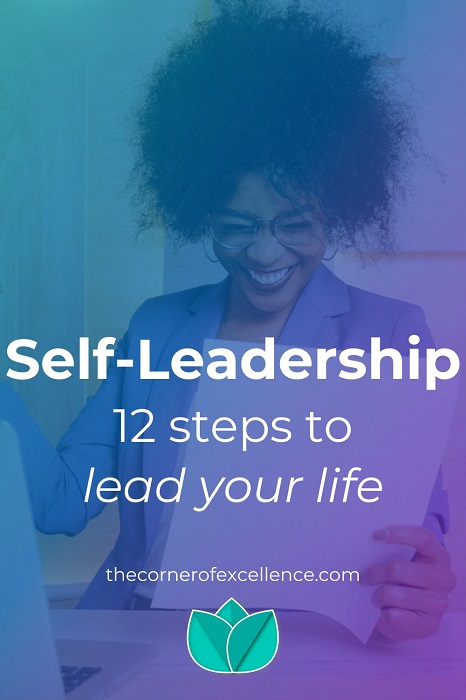Do you think you lead your life? Or do you let yourself be carried by the events? Self-leadership is key to being successful in your life and career; whatever success means to you. So let us see what self-leadership means and how to manage to lead your life.
What does self-leadership mean?
No one can lead our life for us. The question is whether you really lead your life. Do you find yourself in the passenger seat watching it happen? Or are you in the driver’s seat? That is, you make decisions and have habits that allow you to live the life you want.
Professor Charles Manz coined the term self-leadership in 1983 and defined it as “a comprehensive perspective of self-influence that refers to leading oneself.” But he also said that “all human beings are ‘self-leaders’; however, not all ‘self-leaders’ are effective at self-leadership.”
Peter Drucker later said that to be a ‘self-leader’ is to serve as the boss, captain, or CEO of one’s life.
Andrew Bryant and Ana Kazan define it as follows: “Self-leadership is the practice of intentionally influencing your thoughts, feelings, and actions toward your objective/s.” They are the authors of the bestseller ‘Self Leadership – How to Become a More Effective, and Efficient Leader from the Inside Out’.
Why practice self-leadership?
You want to be happy? Do you want to be satisfied with your life? Do you have dreams and aspirations, but do not manage to reach them? There are very good reasons for the being the leader of your life.
But this is difficult if you live your life like a candle in the wind; if you let yourself be led by the events without taking an active part. Happy and successful people feel in control of their destiny. They lead their life with intent and purpose. That is because feeling that your life has meaning is most satisfying. But to be successful in that endeavour, you need effective self-leadership.
How to practice self-leadership
Self-leadership means taking responsibility for our lives, our thoughts, feelings, and actions. It means defining how we want to live and what we aspire to. In addition, it means creating habits and taking actions that lead you to where you want to go. But that also requires feeling capable of doing what we want.
Let us look at the qualities and habits that help you practice effective self-leadership.
1. Take responsibility
To lead your life, the first thing is to lead yourself. To do this, you need to abandon the victim mentality that blames others or the circumstances. You need to take responsibility for your thoughts, feelings, and actions.
As well, do not let others control how you should think and act. Analyse the often subtle ways in which you have allowed yourself to be seduced into relinquishing responsibility. You ultimately decide how you want to feel.
2. Think and feel effectively
Once you take responsibility for your thoughts and feelings, pay attention to your inner dialogue. How do you talk to yourself? With love and respect or in a way that undermines your self-esteem?
The key is to train yourself to pay more attention to positive thoughts and to treat yourself with love and self-compassion.
Also pay attention to when you feel triggered, positively or negatively, by situations. In the case of situations that are negative for you, try not to jump to conclusions.
Instead, get curious and ask yourself, “Why did they do that?” This allows you to reflect and consider situations from different angles. You also buy time to not react rashly in a negative way. If you start paying attention to your reactions, you will be able to recognise patterns of behaviour that may not always be the most appropriate or effective.
Ultimately, self-leadership means first becoming aware of your thoughts and feelings. This way you can detect patterns that may require improvement. Then you can learn and train more effective behavioural responses.
3. Find your purpose
To lead yourself you need to know your purpose. That means why you want what you want. That gives you intrinsic motivation, and direction.
So ask yourself what is really important to you. Then define what success means to you. Once you are clear about that, ask yourself why you want to be successful.
To get to the bottom of your motivations, delve into your good reason. Ask yourself why and what for. Then reflect on what is important about it. Repeat it over and over again until you really get to your purpose and your underlying motivations.
4. Know yourself
To practice effective self-leadership you need to know yourself well. That is on the one hand your abilities, strengths and weaknesses. On the other hand, it requires becoming aware of your mind.
In this sense there are things on your mind, let us say more aware, and things at the back of your mind, i.e. more subconscious. The first are words, images, associations and meanings. The second group includes your values, purpose, intentions, and outcomes.
Self-awareness gives you perspective to observe your inner and outer world. In this way it allows you to learn to predict your behaviours. That, in turn, allows you to control and choose how to act. If you want different results, you need to change. To change you firstly need to change your mindset, i.e. your attitude and way of thinking. Then you can change your actions.
So take advantage of your self-awareness to take a step back and ask yourself: Why do I do this? Why do I see this this way? How can I think and feel differently to achieve different results?
5. Believe in yourself
Another essential point in self-leadership is your self-confidence. We often sabotage our potential for growth and success due to a lack of confidence.
When you have confidence in yourself you do not feel the need to compare yourself to others. You know that the only valid comparison is with who you were, who you are, and who you want to be.
For this, you need to take responsibility for your internal and external powers. Inner powers are your thoughts and feelings. External powers are the ability to speak and take action.
Our point of view will not always be the correct one. Our actions will not always lead to success. But with self-awareness and trying to be the best version of yourself, you can trust that you have given your best. You have done the best you knew and could. So, when you speak and act with self-confidence, your results will be better than if you do it with self-doubt.
Remember that you cannot control what others think and how they act. But you can control how you think, feel and act. That is why you should value yourself and accept yourself as you are. You are unique and capable of learning and growing.
6. Be self-efficient
This point is related to the previous one. With self-confidence we take responsibility for our present. With self-efficiency we take responsibility for our future.
This is about believing that we can deal with anything that comes our way. That is, we accept the consequences, be they positive or negative, of any situation with the belief that we can handle them.
It means being willing to try new things. The secret to success is taking action, evaluating the situation and results, reviewing our assumptions, making adjustments, and moving on.
In Neurolinguistic Programming it is often said that there is no failure; only feedback to improve. Making mistakes allows us to move forward and learn to do better next time. In this sense, perfectionism is of little use to you. It only holds you back. It is better to adopt a “better done than perfect” mentality if you want to progress.
Therefore, being self-efficient allows you to be creative, innovative and more resilient.
7. Be your best version
A good self-leader aspires to personal mastery and excellence. Practicing self-leadership means choosing to be the best you can be. That means first committing to who you want to be. Then it means acting accordingly, adopting good habits and behaviours that allow you to get where you want to go.
All this requires an open mind and a curiosity to continuously learn and develop. However, to be successful you will need to do it from a place of self-acceptance.
8. Prioritise
Leading your life and being your best version requires taking time for what really matters to you. True self-leaders know their priorities. They also know how to manage their energy and time to dedicate them to what matters most to them and what leads them to where they want to go.
9. Learn to say “no”
Prioritising means saying ‘yes’ to what is most important and ‘no’ to what takes you away from your purpose, values, priorities and aspirations. So learn to say “no” to everything that can hold you back or derail you from your path.
It can be negative self-talk or habits that do not suit you. Perhaps it is the opinions of others about how you should be. Maybe it is the need for approval from others. Perhaps you do not value yourself enough. Maybe you tend to be indecisive and procrastinate. Or perhaps you are afraid of missing out on something. That is why you accept any invitation and sign up for any plan or event. Perhaps you make promises for fear of saying ‘no’ that you later have a hard time keeping.
10. Celebrate your successes
Feeling proud of your achievements is essential to motivate you. In this way you reinforce your self-leadership and increase the chances of success in your life and career.
Have you started a good habit or managed to maintain one? Have you obtained any personal or professional achievement? Or, have you taken time for your personal or professional development?
Then give yourself a pat on the back, do a happy dance, pamper yourself in some way, or whatever comes to mind to celebrate. Acknowledging the path you have travelled and everything you have already achieved will help you enjoy life’s journey more, as well as consolidate good habits.
11. Influence
Practicing effective self-leadership also means influencing others. But careful, because I am not talking about manipulation. It means using your confidence, your clear intentions, and your self-efficiency to ask for what you need.
But it also requires listening actively to what others say and paying attention to what they do. Find out their intentions, motivations, beliefs and values. All this influences their behaviour. Then connect their intentions with what you would like to convince them about.
12. Have a positive impact
People do not usually measure our self-esteem and our worth. They measure our impact through what we say and do.
An effective self-leader leads by example. Use emotional intelligence to manage your emotions and relate to others in a respectful way. Taking responsibility, being self-efficient, prioritising, working on your goals and being assertive sets an example of how to lead one’s life. In this way you will encourage others to take control of their lives and improve their self-leadership.
Do you practice self-leadership?
Do you think you lead your life? Are you in the driver’s or passenger seat of your life? Does it depend on the situation?

Sharing is caring!




